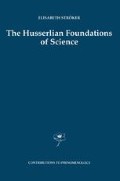Abstract
The focal point of this chapter is the transition from the static structural analysis of consciousness to genetic constitutive analysis, which is of great importance for Husserl’s deepened conception of intentionality. This change is due to Husserl’s realization that the constitution of objectivity is not achieved in single, distinct acts but in a temporal genesis in which active constitutions in the past as well as passive pre-constitutions are involved. To disclose these sediments Husserl developed his phenomenological analysis of intentional acts into what he called “intentional analysis.” This kind of analysis also led to a new thematization of the “I.” From that point on the “I” was no longer conceived as a mere source of acts but emerged as a field of self-experience, so that by means of its sense-constituting achievements it gains its own characteristics, thus revealing itself as a concrete ego.
Access this chapter
Tax calculation will be finalised at checkout
Purchases are for personal use only
Preview
Unable to display preview. Download preview PDF.
Reference
This does not mean that Husserl would have rejected other kinds of intentionality, such as the intentionality of actions, nor that there are also non-intentional modes of consciousness. Rather it only means that intentional consciousness was Husserl’s main topic, and he certainly claimed that the intentionality of consciousness is fundamental for philosophical theory of intentionality in general. It is this Husserlian claim which prominent philosophers saw as something decisively new in the history of modern philosophy, especially for a more fruitful reformulation of epistemology. For informative hints. cf. Aron Gurwitsch, “Towards Theory of Intentionality,” in Philosophy and Phenomenological Research, Vol. XXX (1970), 354.
Aron Gurwitsch, “Husserl’s Theory of Intentionality of Consciousness in Historical Perspective,” in his Phenomenology and the Theory of Science (Evanston: Northwestern University Press, 1974), 210–240; furthermore
Jitendra N. Mohanty, “Can Intentionality be Explained Away?,” in: Indian Review of Philosophy, Vol. 2, (1972), 167–196.
The noemata are, contrary to the noeses, in which the former are “constituted,” identifiable unities that have the status of sense, or meanings, by means of which acts are referred to objects. Husserl regards them as sense-unities (Sinneinheiten) in general, insofar as they belong to any type of acts, so that, for instance, linguistic meanings — qua intentional entities — represent a subclass of noemata. In this connection a large amount of literature has been generated. See the early essay by. Dagfinn Føllesdal “Husserl’s Notion of Noema,” in The Journal of Philosophy, Vol. 66, (1966), 269ff.
Jitendra N. Mohanty, “Intentionality and Noema,” in The Journal of Philosophy, Vol. 78 (1981), 706ff.; furthermore the essays in The Phenomenology of the Noema, ed. John J. Drummond and Lester Embree (Dordrecht: Kluwer Academic Publishers, 1992). The literature on this topic often also refers to connections between.
Husserl and Frege. On that topic, see the comprehensive study by Jitendra N. Mohanty, Husserl and Frege (Bloomington: Indiana University Press, 1982).
Author information
Authors and Affiliations
Rights and permissions
Copyright information
© 1997 Springer Science+Business Media Dordrecht
About this chapter
Cite this chapter
Ströker, E. (1997). Intentionality and Constitution: Changes in the Concept of Intentionality in Edmund Husserl’s Philosophy. In: The Husserlian Foundations of Science. Contributions to Phenomenology, vol 30. Springer, Dordrecht. https://doi.org/10.1007/978-94-015-8824-9_4
Download citation
DOI: https://doi.org/10.1007/978-94-015-8824-9_4
Publisher Name: Springer, Dordrecht
Print ISBN: 978-90-481-4910-0
Online ISBN: 978-94-015-8824-9
eBook Packages: Springer Book Archive

